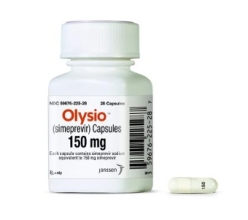 The U.S. Food and Drug Administration (FDA) has approved Janssen Therapeutics’ NS3/4A protease inhibitor Olysio (simeprevir) for the treatment of those with genotype 1 of hepatitis C virus (HCV) who have compensated liver disease, including cirrhosis. People who are treatment naive as well as those who have failed a previous attempt at a hep C cure may benefit from the drug, which is to be taken in combination with pegylated interferon and ribavirin.
The U.S. Food and Drug Administration (FDA) has approved Janssen Therapeutics’ NS3/4A protease inhibitor Olysio (simeprevir) for the treatment of those with genotype 1 of hepatitis C virus (HCV) who have compensated liver disease, including cirrhosis. People who are treatment naive as well as those who have failed a previous attempt at a hep C cure may benefit from the drug, which is to be taken in combination with pegylated interferon and ribavirin.
The recommended treatment regimen for people who are treatment naive and for those who relapsed after prior treatment is 12 weeks of Olysio combined with 24 weeks of interferon and ribavirin. For prior partial- and null-responders, the recommended regimen is 12 weeks of Olysio combined with 48 weeks of the other two drugs.
“Given the complexity of the condition, Olysio was studied in a number of different patient populations, including individuals who have relapsed or failed to respond to previous treatments,” Douglas Dieterich, MD, a professor of medicine in the division of liver diseases at Mount Sinai School of Medicine in New York City, who was Olysio’s clinical trial investigator, said in a release. “The FDA approval of Olysio is an important milestone for people living with chronic hepatitis C as it means that patients have a new treatment option with the potential to cure this challenging disease.”
In clinical trials, the efficacy of the drug was markedly lower among those with genotype 1a of the virus who had the NS3 polymorphism Q80K, which is a variation in the hep C NS3/4A protease enzyme.
The approval was based in part on results from three Phase III studies, QUEST-1 and QUEST-2 in treatment-naive study participants, and PROMISE in those who had relapsed after previous interferon-based treatment for the virus. The Phase IIb ASPIRE study of prior non-responders also played into the decision.
A pooled analysis of QUEST-1 and QUEST-2 found that 80 percent of treatment-naive participants in the study achieved a sustained virologic response 12 weeks after completing therapy (SVR12, considered a cure), compared with just 50 percent of those taking a placebo in place of Olysio. In the PROMISE study, 79 percent of participants who had relapsed after a previous treatment achieved an SVR12, compared with 37 percent of the placebo group. In the ASPIRE study, 65 percent of prior partial-responders and 53 percent of prior null-responders achieved an SVR24, compared with a respective 9 and 19 percent in the placebo groups.
In the QUEST-1 and QUEST-2 studies, 58 percent of those with genotype 1a who had the Q80K polymorphism achieved an SVR12, compared with 84 percent of those without the polymorphism.
To read an article about the hep C pipeline and the forthcoming revolution in care, click here.
To read the FDA release, click here.
To read the Janssen release, click here.
Advertisement
Advertisement
Advertisement






6 Comments
6 Comments